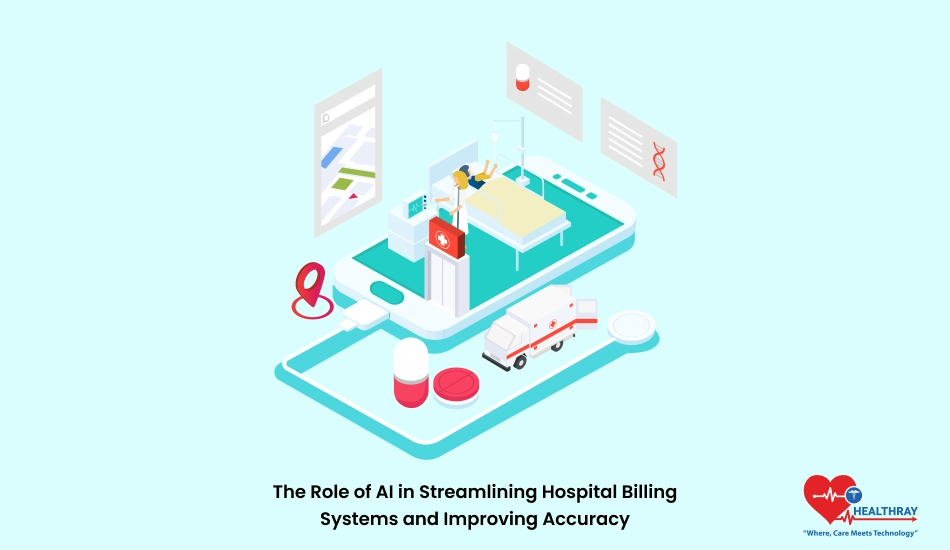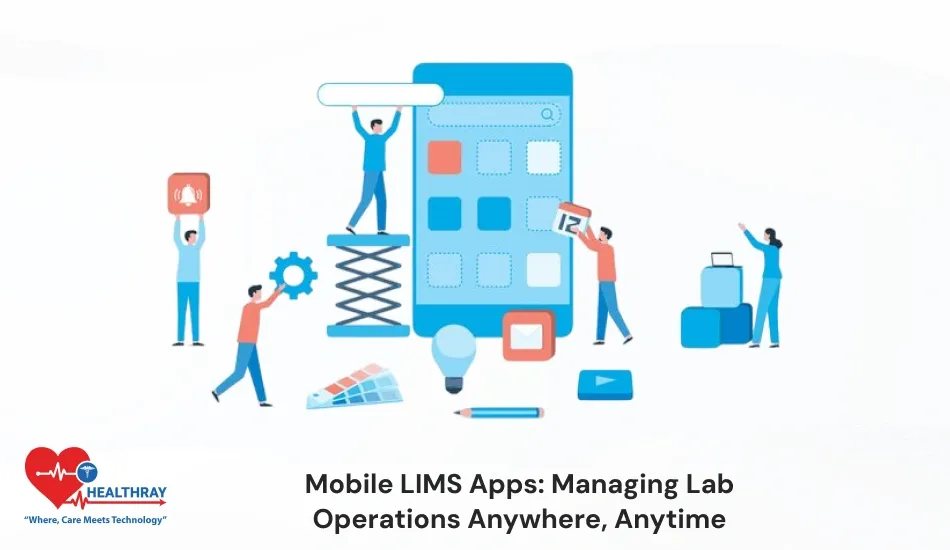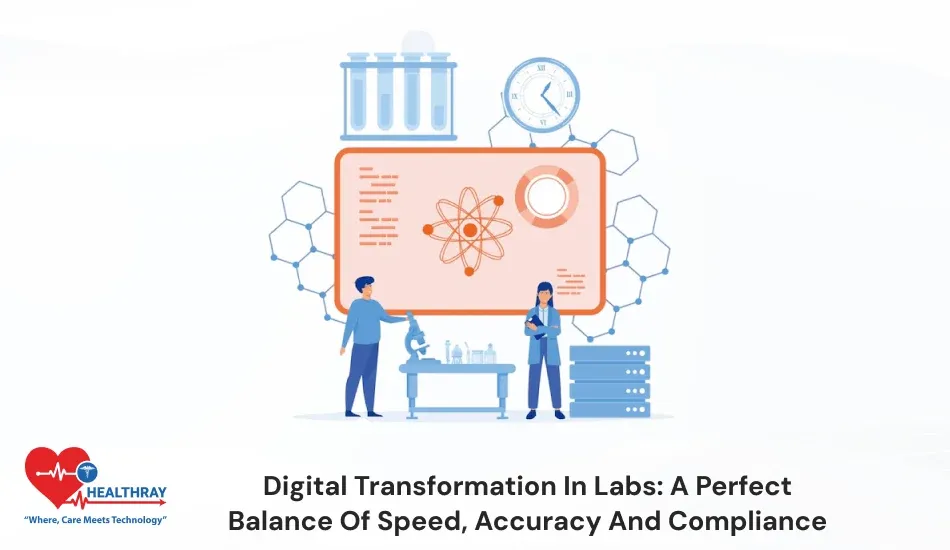Hospital billing is often a maze of complex codes, ever-changing regulations, and immense paperwork. It can feel overwhelming to ensure accuracy while keeping the process efficient. This is where artificial intelligence (AI) steps in as a game-changer for healthcare. AI technologies are transforming billing systems by automating tasks, detecting errors, and providing valuable insights.
But why does this matter? Mistakes in billing can lead to delayed payments, compliance issues, and a loss of trust between patients and providers. AI has the potential to not only simplify these systems but also make them smarter, faster, and more reliable.
In this article, we’ll explore how AI is revolutionizing Medical Billing Software, from automating medical coding to enhancing revenue cycle management. We’ll also look at how these technologies impact hospital administrators, tech professionals, software developers, and doctors, ensuring everyone in the healthcare ecosystem benefits.
AI in Medical Coding: Automating Accuracy and Reducing Errors
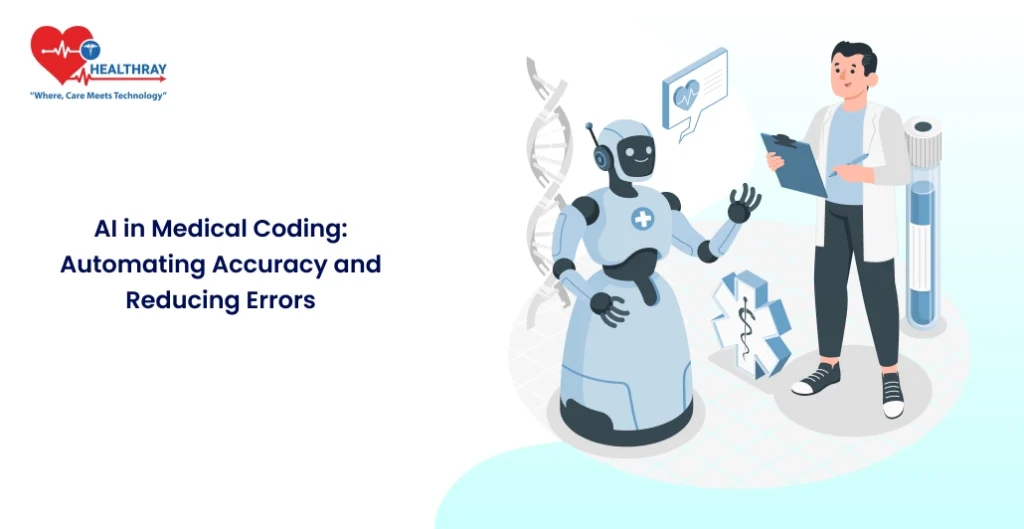
Medical coding is one of the most tedious and error-prone aspects of hospital billing. Translating patient records into standardized codes requires immense attention to detail and a deep understanding of coding guidelines. Errors in this process can lead to claim rejections, delayed payments, or compliance issues. AI is changing the game by automating this process while ensuring higher accuracy.
How AI Transforms Medical Coding
AI systems use natural language processing (NLP) to scan medical records, identify relevant data, and assign the correct codes automatically. These tools analyze unstructured data such as doctor’s notes, test results, and discharge summaries to extract meaningful information.
This automation reduces the burden on human coders, allowing them to focus on complex cases. It also minimizes human error by consistently applying coding rules and updates in real time.
Real-Life Impact
Hospitals using AI-driven coding systems report faster claim submissions and fewer rejections. Coders can process a higher volume of claims in less time, freeing resources for other critical tasks. This directly impacts revenue cycles, as claims are processed more efficiently and payments are received faster.
Challenges in Implementation
Despite its benefits, implementing AI in medical coding isn’t without challenges. The transition requires training staff to work alongside AI tools and adapting workflows to integrate automation effectively. However, the long-term advantages, such as reduced errors and improved efficiency, make it a worthwhile investment.
Enhancing Revenue Cycle Management with AI: A New Era of Efficiency
Managing a hospital’s revenue cycle involves juggling patient billing, insurance claims, payments, and financial reporting. This process is often riddled with inefficiencies, such as delays in claim submissions, errors in documentation, and poor cash flow management. AI offers a solution by streamlining these workflows and providing actionable insights.
How AI Streamlines Revenue Cycles
AI-driven tools excel in automating repetitive tasks like claim submissions, patient eligibility verification, and payment posting. They also provide predictive analytics to identify potential bottlenecks in the revenue cycle. For example, AI can predict claim denials before they occur, giving billing teams a chance to address issues proactively.
AI also enables real-time tracking of billing processes, ensuring transparency at every step. This helps administrators and billing staff monitor the financial health of their institution and take corrective actions when needed.
Faster Payments and Improved Cash Flow
By automating the verification and submission of claims, AI reduces processing times significantly. Hospitals experience quicker reimbursements, leading to better cash flow. Predictive analytics further assist in optimizing payment collections, ensuring revenue leaks are minimized.
Customizing Solutions for Better Results
AI tools can be tailored to fit the unique needs of a hospital. Some systems focus on handling high-volume claims, while others are designed for specialized practices. This adaptability ensures that institutions of all sizes can benefit from the technology.
Overcoming Adoption Barriers
While AI’s potential in revenue cycle management is immense, challenges remain. Hospitals need to invest in training their staff and ensuring compatibility with existing billing systems. Addressing these issues early in the implementation process can set the stage for long-term success.
Ensuring Compliance and Detecting Fraud: How AI Strengthens Billing Systems
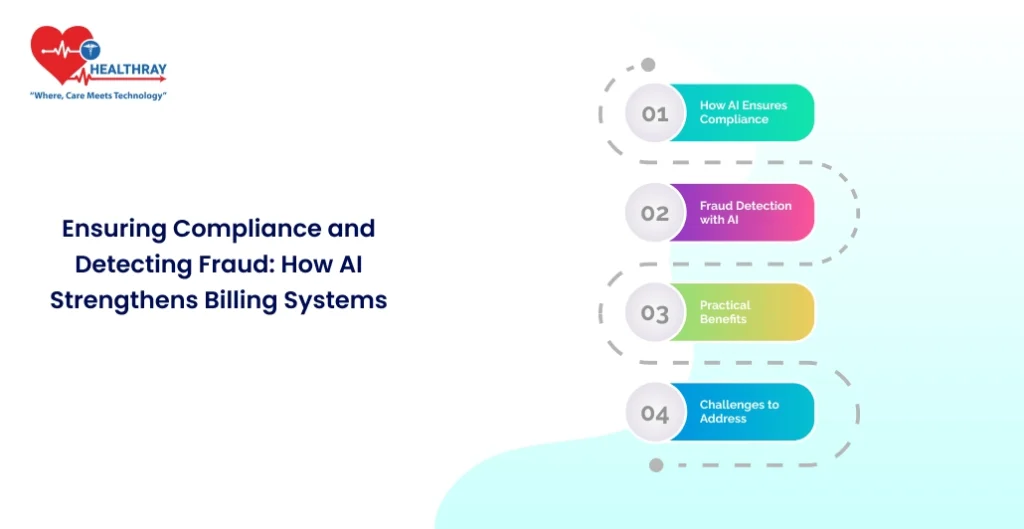
Compliance with healthcare regulations and detecting fraudulent activities are critical for any hospital’s billing system. Errors in billing can lead to hefty fines, legal troubles, and damaged reputations. Fraudulent claims, whether intentional or unintentional, also contribute to financial losses. AI is emerging as a robust tool to tackle these challenges head-on.
How AI Ensures Compliance
AI systems are programmed to stay updated with the latest regulatory changes, such as HIPAA, ICD, and CPT guidelines. They automatically flag billing entries that deviate from these standards, reducing the likelihood of non-compliance. This capability ensures that hospitals avoid costly penalties and maintain their accreditation.
In addition to real-time monitoring, AI provides detailed audit trails. These trails make it easier to review past transactions, identify discrepancies, and demonstrate compliance during inspections.
Fraud Detection with AI
AI’s ability to analyze large datasets makes it an invaluable tool for identifying patterns of fraud. Machine learning algorithms detect anomalies, such as duplicate claims, inflated charges, or inconsistencies in billing data. These systems can even differentiate between errors caused by human oversight and deliberate fraudulent activities.
Hospitals using AI for fraud detection have reported a significant reduction in questionable claims. Early detection not only saves money but also preserves trust with patients and insurers.
Practical Benefits
For hospital administrators, AI simplifies the process of meeting compliance requirements and mitigating fraud risks. Healthcare technology professionals and software developers benefit from AI’s adaptability, as these tools can integrate with existing billing software to enhance security and accuracy. Doctors can rest assured that their billing processes align with regulations, reducing their administrative burden.
Challenges to Address
While AI tools are highly effective, they are not infallible. Hospitals must ensure that human oversight is part of the process to validate flagged entries and review decisions. This hybrid approach combines the efficiency of AI with the critical thinking of experienced staff.
Implementation Strategies: How to Integrate AI into Hospital Billing Systems
Introducing AI into Hospital Billing Software can feel like a significant shift, but with the right strategy, it can be a smooth and rewarding transition. Success lies in thoughtful planning, understanding the institution’s unique needs, and fostering collaboration between teams.
Assess Current Billing Processes
Before adopting AI, hospitals need to evaluate their existing billing workflows. Identify pain points such as recurring errors, bottlenecks, or inefficiencies. Understanding these areas helps in selecting the most suitable AI solutions. For instance, if claim rejections are a major issue, focus on AI tools that specialize in error detection and coding accuracy.
Choose the Right AI Solutions
Not all AI tools are created equal. Hospitals should look for solutions that align with their size, specialties, and existing software. Some tools focus on automating medical coding, while others provide comprehensive revenue cycle management. It’s crucial to work with vendors who understand healthcare regulations and offer customizable features.
Prepare for Integration
Integrating AI requires collaboration between IT teams, software developers, and billing staff. Ensure compatibility between the AI system and existing hospital software. Plan for a phased rollout, starting with non-critical billing tasks to minimize disruptions. Regular feedback loops during this phase can help fine-tune the system for full-scale implementation.
Train and Support Staff
Even the most advanced AI tools need human operators. Training sessions should focus on helping staff understand how AI works, how to use it effectively, and how to interpret its outputs. Encourage open communication to address concerns and build confidence in using the new technology.
Monitor and Optimize
After deployment, continuous monitoring is essential. Evaluate the performance of the AI system against key performance indicators such as claim accuracy, processing times, and revenue improvements. Regular updates and system refinements will ensure the AI remains effective as regulations and billing practices evolve.
Benefits of a Well-Planned Implementation
When implemented correctly, AI not only streamlines billing but also boosts staff morale. Automating repetitive tasks allows employees to focus on more meaningful work, leading to higher productivity and job satisfaction.
Common Pitfalls to Avoid
Rushing the implementation process or neglecting training can lead to frustrations and system failures. Hospitals should also avoid relying solely on AI without human oversight, as this can lead to missed opportunities for improving workflows.
Impact of AI on Healthcare Roles: Transforming the Workplace for the Better
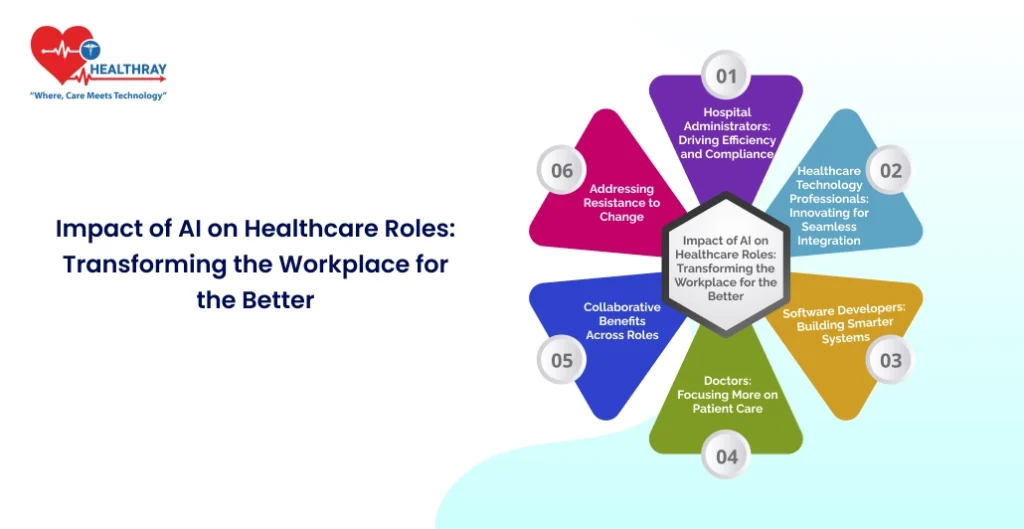
The adoption of AI in hospital billing systems doesn’t just change processes—it reshapes roles across the healthcare ecosystem. From administrators to doctors, everyone benefits in unique ways. Let’s dive into how AI impacts each key group.
Hospital Administrators: Driving Efficiency and Compliance
For administrators, AI tools provide an unparalleled level of oversight. Real-time dashboards and analytics help track billing workflows, identify inefficiencies, and ensure compliance with regulations. By automating routine tasks, administrators can focus on strategic priorities, such as improving patient satisfaction and financial performance.
Healthcare Technology Professionals: Innovating for Seamless Integration
AI opens up new opportunities for healthcare IT teams to innovate. These professionals are responsible for integrating AI into existing systems, ensuring data security, and optimizing performance. AI also empowers them with predictive analytics, helping forecast billing trends and potential challenges.
With AI handling mundane tasks, tech professionals can focus on developing advanced solutions, such as patient-facing tools and smarter data management systems.
Software Developers: Building Smarter Systems
For software developers, the integration of AI into Medical Billing systems means creating more intuitive, robust, and scalable solutions. Developers work on fine-tuning algorithms, ensuring interoperability with hospital databases, and troubleshooting technical issues. AI-driven billing systems also present an opportunity to design user-friendly interfaces that make these tools accessible to non-technical users.
Doctors: Focusing More on Patient Care
Doctors often spend hours dealing with administrative tasks, including billing-related documentation. AI minimizes this burden by automating medical coding and verifying billing information. This allows doctors to dedicate more time to patient care, research, and improving health outcomes.
By improving billing accuracy, AI also strengthens the relationship between doctors and patients. Patients are less likely to experience disputes or confusion over medical bills, fostering trust and satisfaction.
Collaborative Benefits Across Roles
The beauty of AI in billing systems lies in its ability to bridge gaps between these roles. Administrators, tech professionals, developers, and doctors all benefit from improved workflows, enhanced communication, and better financial outcomes. The technology promotes a culture of collaboration, where each group contributes to the hospital’s overall success.
Addressing Resistance to Change
The shift to AI may initially meet resistance from staff unfamiliar with the technology. Transparent communication about AI’s benefits, coupled with hands-on training, can help ease the transition. A collaborative approach ensures that all team members feel supported during this change.
Future Trends: What’s Next for AI in Hospital Billing Systems?
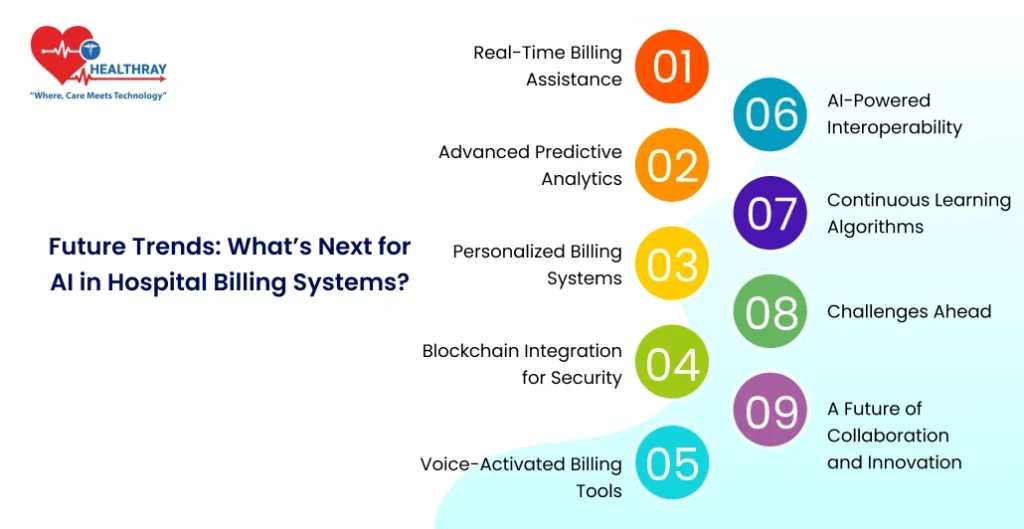
AI is already making waves in hospital billing, but its full potential is far from realized. As technology evolves, the future holds exciting possibilities for even smarter, more efficient systems. Let’s look at the trends shaping the future of AI in healthcare billing.
Real-Time Billing Assistance
AI is moving toward real-time billing solutions that flag errors or compliance issues as data is entered. This means fewer rejected claims and faster reimbursements. Hospitals can expect systems that guide staff through complex billing scenarios, making the process more intuitive and error-free.
Advanced Predictive Analytics
AI tools will become even better at predicting trends in billing and revenue cycles. These insights will help hospitals optimize their financial strategies, anticipate claim denials, and allocate resources more effectively. Predictive analytics could also help identify patient populations at higher risk for delayed payments, enabling tailored approaches to billing and collection.
Personalized Billing Systems
Future AI-driven billing platforms may offer personalized billing experiences for patients. These systems could provide clear, itemized bills, predict out-of-pocket costs, and suggest payment plans based on a patient’s financial history. This would not only improve patient satisfaction but also reduce unpaid bills.
Blockchain Integration for Security
As billing data becomes more digitized, ensuring its security is paramount. Blockchain technology combined with AI is a promising trend for safeguarding sensitive billing information. Blockchain can create tamper-proof records of transactions, while AI monitors for suspicious activities, ensuring data integrity.
Voice-Activated Billing Tools
AI-powered voice recognition tools are set to simplify data entry for doctors and billing staff. Instead of manually inputting billing details, users can dictate them in real time. This innovation will save time and reduce the chance of errors during data entry.
AI-Powered Interoperability
Interoperability is a critical challenge in healthcare. AI is expected to play a major role in ensuring seamless data exchange between billing systems, electronic health records (EHRs), and insurance platforms. This integration will make it easier to share and access patient data across different systems, reducing administrative burdens.
Continuous Learning Algorithms
The next generation of AI systems will learn and adapt as they process more data. These algorithms will become better at recognizing patterns, addressing new challenges, and optimizing workflows without manual intervention. This continuous improvement will make billing systems smarter over time.
Challenges Ahead
While these trends are exciting, challenges such as ethical considerations, cost of adoption, and the need for regulatory clarity will require careful navigation. However, the potential benefits make overcoming these hurdles worthwhile.
A Future of Collaboration and Innovation
AI in hospital billing isn’t just about technology—it’s about creating a better healthcare experience for patients, providers, and staff. As these trends take shape, hospitals that embrace innovation will be at the forefront of delivering efficient and accurate billing services.
Conclusion
Hospital billing has always been a complex and time-consuming process. With the integration of AI, hospitals can now automate repetitive tasks, minimize errors, and improve efficiency across the board. From medical coding to revenue cycle management, AI offers solutions that save time, reduce costs, and ensure compliance.
For hospital administrators, healthcare technology professionals, software developers, and doctors, AI is more than just a tool—it’s a partner in delivering better care and smoother operations. By embracing AI, healthcare organizations can focus on their primary mission: improving patient outcomes.
The road to AI adoption may have its challenges, but the long-term benefits far outweigh the initial hurdles. With careful planning, proper training, and a collaborative approach, hospitals can leverage AI to create smarter billing systems that adapt to future demands.
